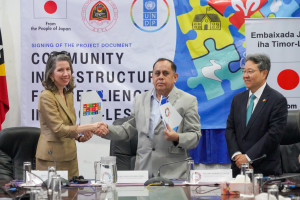Government, UNDP and Japan Sign Partnership to Improve Infrastructure in Rural Communities

The Government of Timor-Leste, through the Minister of State Administration, Tomás do Rosário Cabral, signed an agreement for the Community Infrastructure for Resilience Project (CIReP) with the United Nations Development Program (UNDP) and the Government of Japan at a ceremony held on October 12th, 2023, at the premises of the Ministry of State Administration.
The project, to be implemented between 2023 and 2027, jointly by the Ministry of State Administration and the UNDP, aims to support communities in three municipalities (Ermera, Bobonaro, Liquiçá) and the Special Autonomous Region of Oe-cusse Ambeno, through the construction and rehabilitation of 40 community infrastructure units. This will improve access to essential health, education, markets, irrigation, water, and sanitation services. The project will also promote short-term job creation for the communities, involving skilled and unskilled workers in construction.
With a total budget of US$ 5.1 million, the project is co-financed by the Government of Japan (US$ 4.8 million) and the UNDP (US$ 300,000).
At the signing ceremony, Minister Tomás Cabral stressed that “this project is in line with the Program of the 9th Constitutional Government, which emphasises improving access to basic infrastructures, water and sanitation infrastructures, health infrastructures, as well as economic growth and job creation”.
The Minister acknowledged the UNDP and the Government of Japan for their support and expressed his belief that “the community infrastructure project is crucial to ensuring the resilience and sustainability of our communities”.
The Japanese Ambassador to Timor-Leste, Kimura Tetsuya, explained that “the project concept focuses on the protection and empowerment of citizens, especially the most vulnerable in the communities”. He also expressed the hope that “the resilience of communities will be strengthened through the implementation of this project, which covers all segments of society, including health, education, water and sanitation, markets and irrigation”.
The UNDP Resident Representative in Timor-Leste, Katyna Argueta, highlighted “the importance of building rural community infrastructure and improving access to water, sanitation and health facilities for rural communities, aiming at the economic and social development of Timor-Leste”.










































